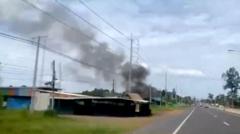With border clashes resulting in over a dozen fatalities, the interaction on social media between Thais and Cambodians has spiraled into a fierce online conflict. Amid escalating tensions, historical grievances and cultural rivalries are being reignited, showcasing the deep rifts that persist beneath the surface of diplomatic relations.
Rising Social Media Hostilities Reflect Deepening Thailand-Cambodia Border Tensions

Rising Social Media Hostilities Reflect Deepening Thailand-Cambodia Border Tensions
As border skirmishes escalate in violence, social media becomes a battleground for national pride and animosity between Thai and Cambodian citizens.
Amid escalating border tensions, which resulted in over a dozen deaths between Thailand and Cambodia, a fierce online battle is unfolding on social media platforms as citizens from both nations exchange increasingly hostile remarks. This virtual conflict highlights deep-seated issues surrounding national pride and identity, as punctuated by longstanding territorial disputes and historical grievances over cultural heritage.
Since the latest skirmish, which saw casualties on both sides, Thai and Cambodian nationalists have engaged in a war of words, with comment threads on social media resembling battlegrounds echoing sentiments of aggression and betrayal. Past longstanding disputes, such as the ownership of ancient temples and claims of cultural appropriation, have resurfaced, intensifying nationalist sentiments and prompting arguments over who fired the first shot in this latest bout of violence.
As the news of the violence spread, young people on both sides flooded social platforms with polarizing content, rallying around hashtags that support their respective narratives. “Justice for Cambodia,” echoed one user, while another countered with “Thailand opened fire.” A particularly glaring exchange highlighted the antagonism when a Thai citizen insulted Cambodian involvement in scammers. This breed of online hostility raises concerns of escalating hatred between the citizens of both nations.
In the past weeks, border relations had already reached a boiling point, following a deadly clash that killed a Cambodian soldier and prompted mutual travel restrictions and a military buildup along the frontier. Journalists’ associations in both countries issued a call for calm, urging social media users to be mindful of the repercussions of misinformation and inflammatory content shared online.
Offline manifestations of this rising tension are troubling; a video depicting a Thai individual slapping a Cambodian worker has gone viral, reflecting how online divisions are spilling into real-world violence. Wilaiwan Jongwilaikasaem, a journalism professor, described this trend as a “war of hate," emphasizing the precarious nature of relationships between people previously unassociated with conflict.
Historical tensions have long fettered relations between Thailand and Cambodia. The conflict traces back over a century, with unresolved territorial demarcations resulting from the colonial era influencing modern relations. Significant disagreement emerged around the registration of the Preah Vihear temple as a UNESCO World Heritage Site, intensifying perceptions of cultural theft, especially after recent controversies over culinary and traditional costume representations.
Amidst this chaos, Cambodia has publicly called for a ceasefire. In the political arena, figures like Thaksin Shinawatra, Thailand’s former Prime Minister, and Cambodia’s Hun Sen are throwing jabs at one another on social media, further complicating an already tense situation. Thaksin’s remarks that military action might be needed have invoked sharp reactions from Hun Sen, leading to a spiral of accusations about national integrity and intentions.
While political tensions between the two countries persist, drawing public ire and further complicating border negotiations, the real danger may lie in ongoing social media exchanges that continue to sow seeds of discord among the general populace. With calls for a ceasefire now echoing, it remains to be seen whether these online hostilities will abate or escalate further in the days to come.
















